- Home
- Ian Fleming
Bond 09 - Thunderball Page 2
Bond 09 - Thunderball Read online
Page 2
The young man did an expert but unnecessary racing change round an island and changed up again. ‘’Bout half an hour.’
He put his foot down on the accelerator and neatly but rather dangerously overtook a lorry at an intersection.
‘You certainly get the most out of your Bluebird.’
The young man glanced sideways to see if he was being laughed at. He decided that he wasn’t. He unbent fractionally. ‘My dad won’t spring me something better. Says this old crate was okay for him for twenty years so it’s got to be okay for me for another twenty. So I’m putting money by on my own. Half way there already.’
Bond decided that the comb-play had made him over-censorious. He said, ‘What are you going to get?’
‘Volkswagen Minibus. Do the Brighton races.’
‘That sounds a good idea. Plenty of money in Brighton.’
‘I’ll say.’ The young man showed a trace of enthusiasm. ‘Only time I ever got there, a couple of bookies had me take them and a couple of tarts to London. Ten quid and a fiver tip. Piece of cake.’
‘Certainly was. But you can get both kinds at Brighton. You want to watch out for being mugged and rolled. There are some tough gangs operating out of Brighton. What’s happened to the Bucket of Blood these days?’
‘Never opened up again after that case they had. The one that got in all the papers.’ The young man realized that he was talking as if to an equal. He glanced sideways and looked Bond up and down with a new interest. ‘You going into the Scrubs or just visiting?’
‘Scrubs?’
‘Shrublands–Wormwood Scrubs–Scrubs,’ said the young man laconically. ‘You’re not like the usual ones I get to take there. Mostly fat women and old geezers who tell me not to drive so fast or it’ll shake up their sciatica or something.’
Bond laughed. ‘I’ve got fourteen days without the option. Doctor thinks it’ll do me good. Got to take it easy. What do they think of the place round here?’
The young man took the turning off the Brighton road and drove westwards under the Downs through Poynings and Fulking. The Austin whined stolidly through the inoffensive countryside. ‘People think they’re a lot of crackpots. Don’t care for the place. All those rich folk and they don’t spend any money in the area. Tea-rooms make a bit out of them – specially out of the cheats.’ He looked at Bond. ‘You’d be surprised. Grown people, some of them pretty big shots in the City and so forth, and they motor around in their Bentleys with their bellies empty and they see a tea-shop and go in just for their cups of tea. That’s all they’re allowed. Next thing, they see some guy eating buttered toast and sugar cakes at the next table and they can’t stand it. They order mounds of the stuff and hog it down just like kids who’ve broken into the larder – looking round all the time to see if they’ve been spotted. You’d think people like that would be ashamed of themselves.’
‘Seems a bit silly when they’re paying plenty to take the cure or whatever it is.’
‘And that’s another thing,’ the young man’s voice was indignant. ‘I can understand charging twenty quid a week and giving you three square meals a day, but how do they get away with charging twenty quid for giving you nothing but hot water to eat? Doesn’t make sense.’
‘I suppose there are the treatments. And it must be worth it to the people if they get well.’
‘Guess so,’ said the young man doubtfully. ‘Some of them do look a bit different when I come to take them back to the station.’ He sniggered. ‘And some of them change into real old goats after a week of nuts and so forth. Guess I might try it myself one day.’
‘What do you mean?’
The young man glanced at Bond. Reassured and remembering Bond’s worldly comments on Brighton, he said, ‘Well, you see we got a girl here in Washington. Racy bird. Sort of local tart if you see what I mean. Waitress at a place called the Honey Bee Tea Shop – or was, rather. She started most of us off, if you get my meaning. Quid a go and she knows a lot of French tricks. Regular sport. Well, this year the word got round up at the Scrubs and some of these old goats began patronizing Polly – Polly Grace, that’s her name. Took her out in their Bentleys and gave her a roll in a deserted quarry up on the Downs. That’s been her pitch for years. Trouble was they paid her five, ten quid and she soon got too good for the likes of us. Priced her out of our market, so to speak. Inflation, sort of. And a month ago she chucked up her job at the Honey Bee, and you know what?’ The young man’s voice was loud with indignation. ‘She bought herself a beat-up Austin Metropolitan for a couple of hundred quid and went mobile. Just like the London tarts in Curzon Street they talk about in the papers. Now she’s off to Brighton, Lewes – anywhere she can find the sports, and in between whiles she goes to work in the quarry with these old goats from the Scrubs! Would you believe it!’ The young man gave an angry blast on his klaxon at an inoffensive couple on a tandem bicycle.
Bond said seriously, ‘That’s too bad. I wouldn’t have thought these people would be interested in that sort of thing on nut cutlets and dandelion wine or whatever they get to eat at this place.’
The young man snorted. ‘That’s all you know. I mean’ – he felt he had been too emphatic – ‘that’s what we all thought. One of my pals, he’s the son of the local doctor, talked the thing over with his dad – in a roundabout way, sort of. And his dad said no. He said that this sort of diet and no drink and plenty of rest, what with the massage and the hot and cold Sitz baths and what have you, he said that all clears the blood-stream and tones up the system, if you get my meaning. Wakes the old goats up – makes’em want to start cutting the mustard again, if you know the song by that Rosemary Clooney.’
Bond laughed. He said, ‘Well, well. Perhaps there’s something to the place after all.’
A sign on the right of the road said ‘ “Shrublands”. Gateway to Health. First right. Silence please. ’ The road ran through a wide belt of firs and evergreens in a fold of the Downs. A high wall appeared and then an imposing, mock-battlemented entrance with a Victorian lodge from which a thin wisp of smoke rose straight up among the quiet trees. The young man turned in and followed a gravel sweep between thick laurel bushes. An elderly couple cringed off the drive at a blare from his klaxon and then on the right there were broad stretches of lawn and neatly flowered borders and a sprinkling of slowly moving figures, alone and in pairs, and behind them a red brick Victorian monstrosity from which a long glass sun-parlour extended to the edge of the grass.
The young man pulled up beneath a heavy portico with a crenellated roof. Beside a varnished, iron-studded arched door stood a tall glazed urn above which a notice said: ‘No smoking inside. Cigarettes here please.’ Bond got down from the taxi and pulled his suitcase out of the back. He gave the young man a ten-shilling tip. The young man accepted it as no less than his due. He said, ‘Thanks. You ever want to break out, you can call me up. Polly’s not the only one. And there’s a tea-shop on the Brighton road has buttered muffins. So long.’ He banged the gears into bottom and ground off back the way he had come. Bond picked up his suitcase and walked resignedly up the steps and through the heavy door.
Inside it was very warm and quiet. At the reception desk in the big oak-panelled hall a severely pretty girl in starched white welcomed him briskly. When he had signed the register she led him through a series of sombrely furnished public rooms and down a neutral-smelling white corridor to the back of the building. Here there was a communicating door with the annex, a long low cheaply-built structure with rooms on both sides of a central passage. The doors bore the names of flowers and shrubs. She showed him into Myrtle, told him that ‘the Chief’ would see him in an hour’s time, at six o’clock, and left him.
It was a room-shaped room with furniture-shaped furniture, and dainty curtains. The bed was provided with an electric blanket. There was a vase containing three marigolds beside the bed and a book called Nature Cure Explained by Alan Moyle, M.B.N.A. Bond opened it and ascertained that the initials stood for ‘Me
mber: British Naturopathic Association’. He turned off the central heating and opened the windows wide. The herb garden, row upon row of small nameless plants round a central sundial, smiled up at him. Bond unpacked his things and sat down in the single armchair and read about eliminating the waste products from his body. He learned a great deal about foods he had never heard of, such as Potassium Broth, Nut Mince, and the mysteriously named Unmalted Slippery Elm. He had got as far as the chapter on massage and was reflecting on the injunction that this art should be divided into Effleurage, Stroking, Friction, Kneading, Petrissage, Tapotement, and Vibration, when the telephone rang. A girl’s voice said that Mr Wain would be glad to see him in Consulting Room A in five minutes.
Mr Joshua Wain had a firm, dry handshake and a resonant, encouraging voice. He had a lot of bushy grey hair above an unlined brow, soft, clear brown eyes, and a sincere and Christian smile. He appeared to be genuinely pleased to see Bond and to be interested in him. He wore a very clean smock-like coat with short sleeves from which strong hairy arms hung relaxed. Below were rather incongruous pin-stripe trousers. He wore sandals over socks of conservative grey and when he moved across the consulting room his stride was a springy lope.
Mr Wain asked Bond to remove all his clothes except his pants. When he saw the many scars he said politely, ‘Dear me, you do seem to have been in the wars, Mr Bond.’
Bond said indifferently, ‘Near miss. During the war.’
‘Really! War between peoples is a terrible thing. Now, just breathe in deeply, please.’ Mr Wain listened at Bond’s back and chest, took his blood pressure, weighed him and recorded his height, and then, after asking him to lie face down on a surgical couch, handled his joints and vertebrae with soft, probing fingers.
While Bond replaced his clothes, Mr Wain wrote busily at his desk. Then he sat back. ‘Well, Mr Bond, nothing much to worry about here, I think. Blood pressure a little high, slight osteopathic lesions in the upper vertebrae – they’ll probably be causing your tension headaches, by the way – and some right sacroiliac strain with the right ilium slightly displaced backwards. Due to a bad fall some time, no doubt.’ Mr Wain raised his eyes for confirmation.
Bond said, ‘Perhaps.’ Inwardly he reflected that the ‘bad fall’ had probably been when he had had to jump from the Arlberg Express after Heinkel and his friends had caught up with him around the time of the Hungarian uprising in 1956.
‘Well now.’ Mr Wain drew a printed form towards him and thoughtfully ticked off items on a list. ‘Strict dieting for one week to eliminate the toxins in the blood-stream. Massage to tone you up, irrigation, hot and cold Sitz baths, osteopathic treatment and a short course of Traction to get rid of the lesions. That should put you right. And complete rest, of course. Just take it easy, Mr Bond. You’re a civil servant, I understand. Do you good to get away from all that worrying paper-work for a while. ’ Mr Wain got up and handed the printed form to Bond. ‘Treatment rooms in half an hour, Mr Bond. No harm in starting right away.’
‘Thank you.’ Bond took the form and glanced at it. ‘What’s Traction, by the way?’
‘A medical device for stretching the spine. Very beneficial.’ Mr Wain smiled indulgently. ‘Don’t be worried by what some of the other patients tell you about it. They call it “The Rack”. You know what wags some people are.’
‘Yes.’
Bond walked out and along the white painted corridor. People were sitting about, reading or talking in soft tones in the public rooms. They were all elderly, middle-class people, mostly women, many of whom wore unattractive quilted dressing-gowns. The warm, close air and the frumpish women gave Bond claustrophobia. He walked through the hall to the main door and let himself out into the wonderful fresh air.
Bond walked thoughtfully down the trim narrow drive and smelled the musty smell of the laurels and the laburnums. Could he stand it? Was there any way out of this hell-hole short of resigning from the Service? Deep in thought, he almost collided with a girl in white who came hurrying round a sharp bend in the thickly hedged drive. At the same instant as she swerved out of his path and flashed him an amused smile, a mauve Bentley, taking the corner too fast, was on top of her. At one moment she was almost under its wheels, at the next, Bond, with one swift step, had gathered her up by the waist and, executing a passable Veronica, with a sharp swivel of his hips had picked her body literally off the bonnet of the car. He put the girl down as the Bentley dry-skidded to a stop in the gravel. His right hand held the memory of one beautiful breast. The girl said ‘Oh!’ and looked up into his eyes with an expression of flurried astonishment. Then she took in what had happened and said breathlessly, ‘Oh, thank you.’ She turned towards the car. A man had climbed unhurriedly down from the driving seat. He said calmly, ‘I am so sorry. Are you all right?’ Recognition dawned on his face. He said silkily, ‘Why, if it isn’t my friend Patricia? How are you, Pat? All ready for me?’
The man was extremely handsome – a dark bronzed woman-killer with a neat moustache above the sort of callous mouth women kiss in their dreams. He had regular features that suggested Spanish or South American blood and bold, hard brown eyes that turned up oddly, or, as a woman would put it, intriguingly, at the corners. He was an athletic-looking six foot, dressed in the sort of casually well-cut beige herring-bone tweed that suggests Anderson and Sheppard. He wore a white silk shirt and a dark red polka-dot tie, and the soft dark brown V-necked sweater looked like vicuna. Bond summed him up as a good-looking bastard who got all the women he wanted and probably lived on them – and lived well.
The girl had recovered her poise. She said severely, ‘You really ought to be more careful, Count Lippe. You know there are always patients and staff walking down this drive. If it hadn’t been for this gentleman,’ she smiled at Bond, ‘you’d have run me over. After all, there is a big sign asking drivers to take care.’
‘I am so sorry, my dear. I was hurrying. I am late for my appointment with the good Mr Wain. I am as usual in need of decarbonization – this time after two weeks in Paris.’ He turned to Bond. He said with a hint of condescension, ‘Thank you, my dear sir. You have quick reactions. And now, if you will forgive me – ’ He raised a hand, got back into the Bentley, and purred off up the drive.
The girl said, ‘Now I really must hurry. I’m terribly late.’ Together they turned and walked after the Bentley.
Bond said, examining her, ‘Do you work here?’ She said that she did. She had been at Shrublands for three years. She liked it. And how long was he staying? The small-talk continued.
She was an athletic-looking girl whom Bond would have casually associated with tennis, or skating, or show-jumping. She had the sort of firm, compact figure that always attracted him and a fresh open-air type of prettiness that would have been commonplace but for a wide, rather passionate mouth and a hint of authority that would be a challenge to men. She was dressed in a feminine version of the white smock worn by Mr Wain, and it was clear from the undisguised curves of her breasts and hips that she had little on underneath it. Bond asked her if she didn’t get bored. What did she do with her time off?
She acknowledged the gambit with a smile and a quick glance of appraisal. ‘I’ve got one of those bubble cars. I get about the country quite a lot. And there are wonderful walks. And one’s always seeing new people here. Some of them are very interesting. That man in the car, Count Lippe. He comes here every year. He tells me fascinating things about the Far East – China and so on. He’s got some sort of a business in a place called Macao. It’s near Hong Kong, isn’t it?’
‘Yes, that’s right.’ So those turned-up eyes were a dash of Chinaman. It would be interesting to know his background. Probably Portuguese blood if he came from Macao.
They had reached the entrance. Inside the warm hall the girl said, ‘Well, I must run. Thank you again.’ She gave him a smile that, for the benefit of the watching receptionist, was entirely neutral. ‘I hope you enjoy your stay.’ She hurried off towards the treatment rooms.
Bond followed, his eyes on the taut swell of her hips. He glanced at his watch and also went down the stairs and into a spotlessly white basement that smelled faintly of olive oil and Aerosol disinfectant.
Beyond a door marked ‘Gentlemen’s Treatment’ he was taken in hand by an indiarubbery masseur in trousers and singlet. Bond undressed and with a towel round his waist followed the man down a long room divided into compartments by plastic curtains. In the first compartment, side by side, two elderly men lay, the perspiration pouring down their strawberry faces, in electric blanket-baths. In the next were two massage tables. On one, the pale, dimpled body of a youngish but very fat man wobbled obscenely beneath the pummelling of his masseur. Bond, his mind recoiling from it all, took off his towel and lay down on his face and surrendered himself to the toughest deep massage he had ever experienced.
Vaguely, against the jangling of his nerves and the aching of muscles and tendons, he heard the fat man heave himself off his table and, moments later, another patient take his place. He heard the man’s masseur say, ‘I’m afraid we’ll have to have the wrist-watch off, sir.’
The urbane, silky voice that Bond at once recognized said with authority, ‘Nonsense, my dear fellow. I come here every year and I’ve always been allowed to keep it on before. I’d rather keep it on, if you don’t mind.’
‘Sorry, sir.’ The masseur’s voice was politely firm. ‘You must have had someone else doing the treatment. It interferes with the flow of blood when I come to treat the arm and hand. If you don’t mind, sir.’
There was a moment’s silence. Bond could almost feel Count Lippe controlling his temper. The words, when they came, were spat out with what seemed to Bond ludicrous violence. ‘Take it off then.’ The ‘Damn you’ didn’t have to be uttered. It hung in the air at the end of the sentence.

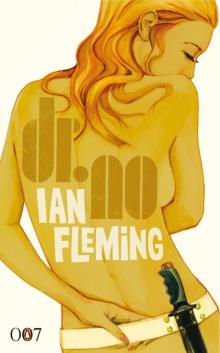 Doctor No
Doctor No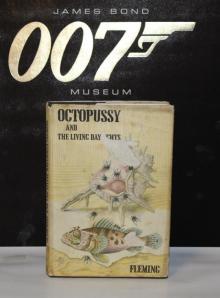 Octopussy & the Living Daylights
Octopussy & the Living Daylights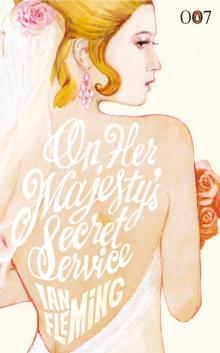 On Her Majestys Secret Service
On Her Majestys Secret Service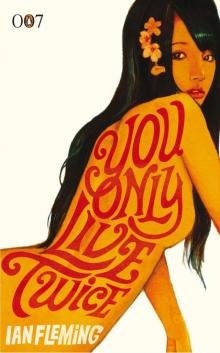 You Only Live Twice
You Only Live Twice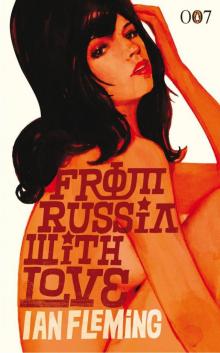 From Russia With Love
From Russia With Love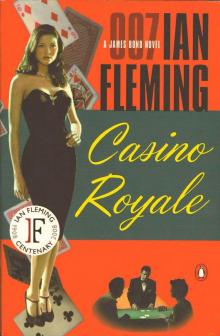 Casino Royale
Casino Royale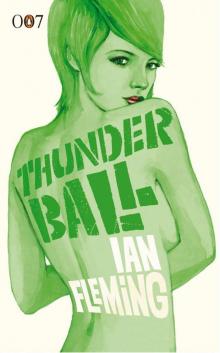 Thunderball
Thunderball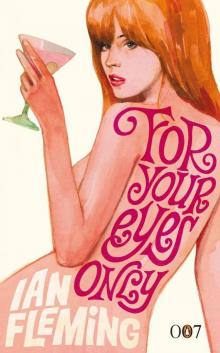 For Your Eyes Only
For Your Eyes Only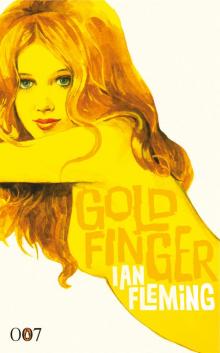 Goldfinger
Goldfinger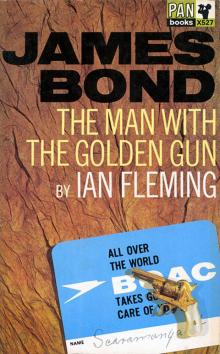 The Man With the Golden Gun
The Man With the Golden Gun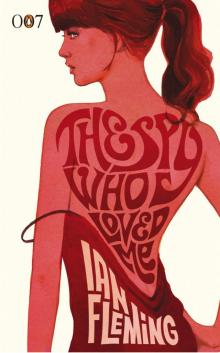 The Spy Who Loved Me
The Spy Who Loved Me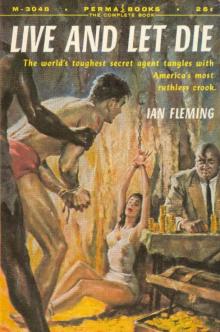 Live and Let Die
Live and Let Die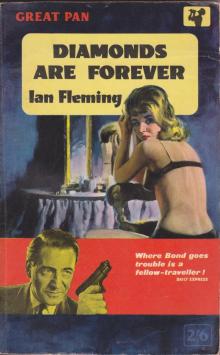 Diamonds Are Forever
Diamonds Are Forever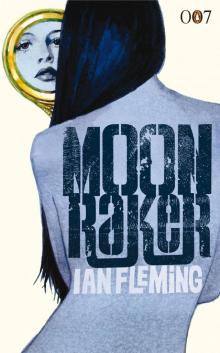 Moonraker
Moonraker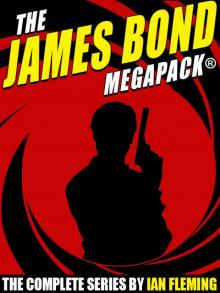 The James Bond MEGAPACK®
The James Bond MEGAPACK®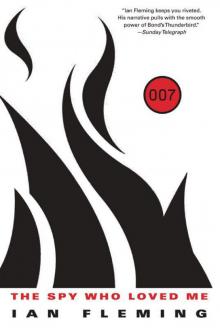 Bond 10 - The Spy Who Loved Me
Bond 10 - The Spy Who Loved Me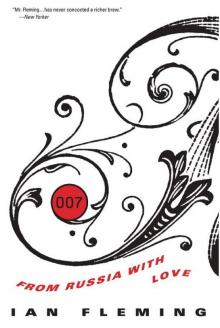 From Russia with Love (James Bond - Extended Series Book 5)
From Russia with Love (James Bond - Extended Series Book 5)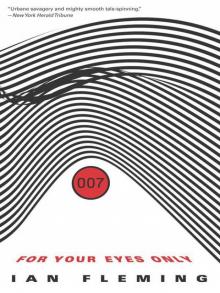 Bond 08 - For Your Eyes Only
Bond 08 - For Your Eyes Only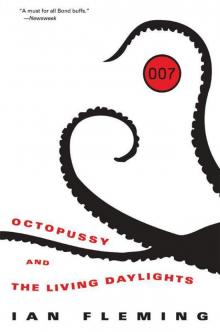 Bond 14 - Octopussy and the Living Daylights
Bond 14 - Octopussy and the Living Daylights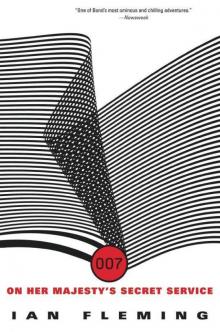 Bond 11 - On Her Majesty's Secret Service
Bond 11 - On Her Majesty's Secret Service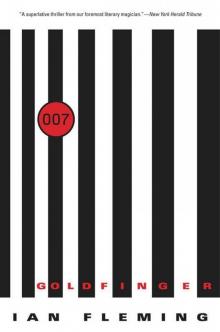 Bond 07 - Goldfinger
Bond 07 - Goldfinger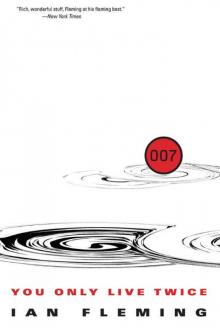 Bond 12 - You Only Live Twice
Bond 12 - You Only Live Twice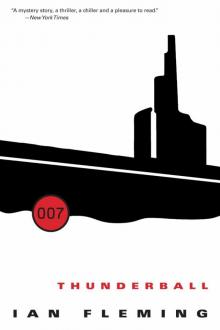 Bond 09 - Thunderball
Bond 09 - Thunderball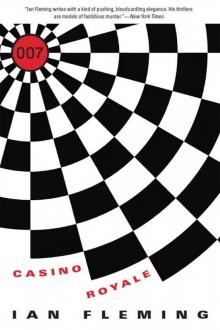 Bond 01 - Casino Royale
Bond 01 - Casino Royale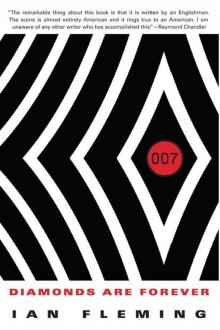 Diamonds are Forever (James Bond - Extended Series Book 4)
Diamonds are Forever (James Bond - Extended Series Book 4)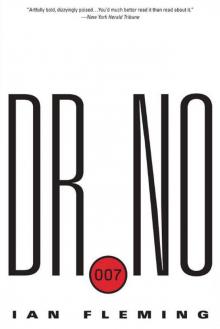 Bond 06 - Dr. No
Bond 06 - Dr. No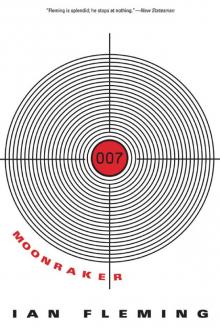 Moonraker (James Bond - Extended Series Book 3)
Moonraker (James Bond - Extended Series Book 3)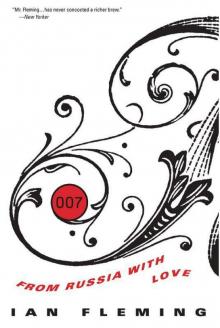 Bond 05 - From Russia With Love
Bond 05 - From Russia With Love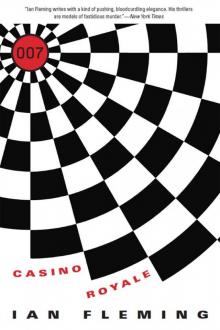 Casino Royale (James Bond - Extended Series Book 1)
Casino Royale (James Bond - Extended Series Book 1)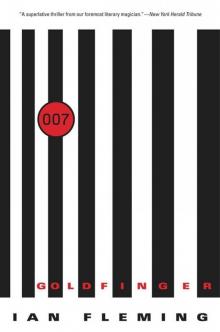 Goldfinger (James Bond - Extended Series Book 7)
Goldfinger (James Bond - Extended Series Book 7)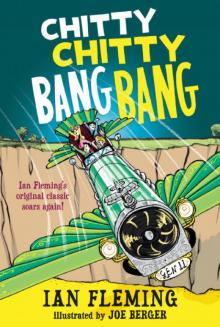 Chitty Chitty Bang Bang: The Magical Car
Chitty Chitty Bang Bang: The Magical Car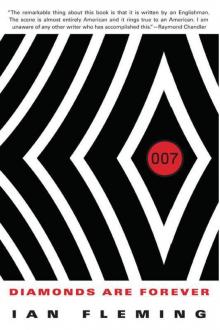 Bond 04 - Diamonds Are Forever
Bond 04 - Diamonds Are Forever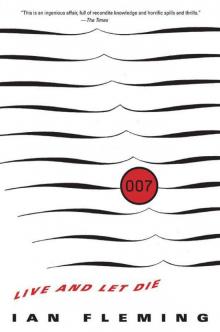 Bond 02 - Live and Let Die
Bond 02 - Live and Let Die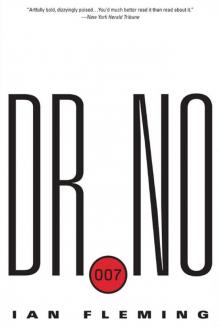 Dr. No (James Bond - Extended Series Book 6)
Dr. No (James Bond - Extended Series Book 6) The Hildebrandt rarity
The Hildebrandt rarity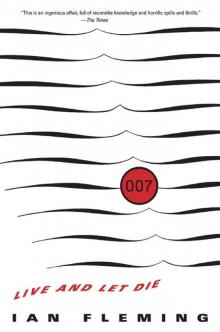 Live and Let Die (James Bond - Extended Series Book 2)
Live and Let Die (James Bond - Extended Series Book 2)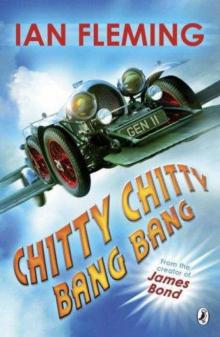 Chitty Chitty Bang Bang
Chitty Chitty Bang Bang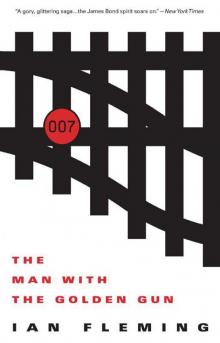 Bond 13 - The Man With the Golden Gun
Bond 13 - The Man With the Golden Gun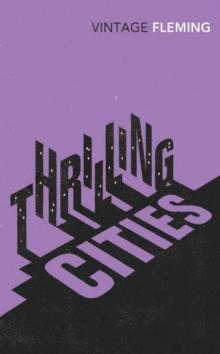 Thrilling Cities
Thrilling Cities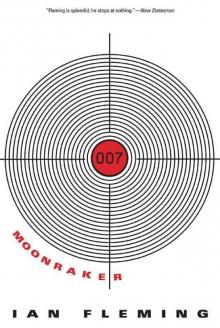 Bond 03 - Moonraker
Bond 03 - Moonraker